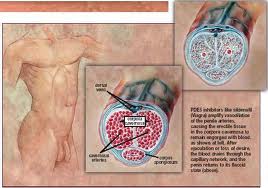Last Updated on: January 19, 2024
Edited By: Alfred
- Primary
- Secondary
Primary:
An inability to achieve or maintain an erection is the primary symptom of impotence. This can be due to a history of impotency since childhood, inability to attain an erection after a certain age or inability to sustain the erection for penetrative sex to take place. Most men, post the age of 35 experience a decline in their libido with temporary loss of erection. This does not necessarily mean that they are suffering from erectile dysfunction. It could be due to mental stress, fatigue, depression, trauma or duet to some medication. Once the underlying cause is removed, the patient reverts back to his healthy self. Erectile dysfunction is diagnosed only if the condition persists at least 25 % of the time. Having this disorder does not mean loss of sexual desire in a man, or the inability to ejaculate. Patients do get aroused and have climax even in the flaccid state.
Secondary:
Besides the primary cause it can also manifest itself in the form of stress, low self-esteem, social withdrawals, strained relationship with the partner, lack of interest in sex, anxiety and depression. Clinical symptoms:
- A physical examination may reveal penile plaques, prostrate infection, hypertension and possibility of prostate cancer.
- Studies suggest a correlation between hypertension and erectile dysfunction. This can be taken into account as they both are manifestations of vascular disorders.
- Some studies also suggest a correlation between benign prostatic hyperplasia and erectile dysfunction
- Evaluation of texture of the testes, the presence of the epididymis and vas deferens, and abnormalities of the male organ for reproduction such as hypospadias and Peyronie plaques.
Warning Signs:
Though sex is not required to keep a man alive, it may also be a symptom of various other underlying causes that can prove fatal.
- Medical records prove that men presenting with erectile dysfunction may be suffering from cardiovascular disorder.
Erection occurs due to sudden rush of blood to the male organ for reproduction which leads to engorgement of male organ for reproduction. If there is a disease that affects the blood vessels, it can interfere with the blood flow to the male organ for reproduction. Atherosclerosis (hardening of the arteries) and hypertension can cause abnormal blood flow to the male organ for reproduction and can affect the patients ability to have an erection.
- Low testosterones
Testosterones are important for sex drives. Patients of erectile dysfunction may demonstrate a low count of testosterones which could arise due to thyroid abnormalities; liver problems; and abnormalities within the testes themselves.
- Nerve damage
If the nerves that carry signals to the brain get damaged, it can result in an inability to get an erection. This can happen due to
- Diabetes: People who are not able to control their sugar levels may develop neuropathy (nerve damage) which can affect the limbs and venereal.
- HIV: Studies have shown that people who test positive for HIV can develop this disorder as the virus can damage the nerves and the antiviral treatments also result in neuropathy.
- Multiple sclerosis: This is a disease that affects the nerves and patients of this disease can suffer from ED.
- Spinal cord injuries can cause nerve damage that can result in this disorder.


Comments are closed.